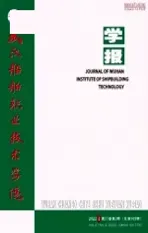When-clause的涵义、特殊用法及翻译
2013-08-15赵爱萍
赵爱萍
(浙江水利水电学院,浙江杭州 310018)
when用作连词,表示时间发生的先后关系,除表示“在…… 时候”外,在具体语境中还有许多含义,此外when具有“突然性、巧合性”及“矛盾性”的特殊含义(如:The truth occurred to him when he was in his bath.他洗澡时忽然悟出了其中真相)。when-clause的特殊用法一般辞书很少提及,我们在理解、翻译时不能机械地固守“当 …… 时候”,否则会对其理解不到位或翻译欠准确。
1 when-clause的含义及特殊含义
翻译时应注意句子的逻辑关系和关联词的使用。
1.1 when-clause的时间关系
(1)when关系连词,引导非限制性定于从句。When相当于at that time,and then,upon or after which,意为:然后。when只能放在句末,when的前面一般要有逗号。有的语法家称其为并列连词。常译为:那时、届时等。
when相当于and then,upon or after which,意为:然后。when只能放在句末,when的前面一般要有逗号。有的语法家称其为并列连词。
The conflict began,when it soon appeared which was stronger.冲突开始了,谁是强者不久就见了分晓。_____________
The president will visit the town in May,when he will open the new hospital.总统将于五月访问该城,届时他将主持这所新医院的开业典礼。
(2)when…not相当于 before,意为:来不及、还没有,常译为否定句。
He went to class when he had not finished his homework.(= He went to class before he had finished his homework.)他没有做完作业就去上课。
We had not fired a shot when the hawks all flew away.(= The hawks all flew away before we fired a shot.)我们来不及发出一弹,老鹰全飞走了。
(3)when相当于at any time that,whenever,意为:每当、无论何时,有时表明主句的动作呈习惯性、规律性。
The stars are brightest when there is no moon.每当无月,星光特别明亮。
He is impatient when he is kept waiting.每次让他等候的时候他就不耐烦。
(4)when相当于after,暗示前后两个动作紧密相连。有时表示从句动作先于主句动作发生,意为:在…… 之后。
When he had come into power,he began to misrule.他得到政权之后就开始暴政。
When plants died and decayed,they formed organic materials.植物死亡并腐烂后,便形成有机物。
(5)when相当于and just then,and at that moment意为:就在这时候。
I’d just got to work in my room when mother came in.我正打算在房间里用功的时候,母亲走进来了。
(6)when相当于not until或wait until,意为:“直到…… 才”。
When he was sleepwalking,his wife fell asleep.等到他漫游的时候,她才能睡着。
(7)when相当于as soon as,意为:一 ……就……。表示从句动作完成之后主句动作立刻发生。
We’ll start when our teacher comes.老师一 来,我们就出发。
When he saw her,he stopped and bowed his head so that he need not look at her.他一见到她就止住脚步,低下头,不去看她。
有时,when相当于just after which,意为:一 …… 就……;刚…… 就…… 。
He had just drifted off to sleep when the phone rang.他刚睡着电话铃就响了。
(8)在现代英语中(以往被认为是错句),when用作关系代词,作which time解,作从句介词的宾语。
I met him a year ago,since when I haven’t seen anything of him.一年之前我碰见过他,从此之后连他的影子都没见过。
The removal will be done next summer,by when the house should be ready.搬迁工作明年夏天进行,到那时房子该装修完毕。
(9)when在下列句子中被省略,具有when时间状语从句的表意功能,其表达凝练简洁。
The good tidings filled the whole nation with joy.= When the good tidings came,the whole nation was filled with joy.捷报传来,举国欢腾。
when及其它成分在俗语或口语语体中常省略,但有时易引起误解。
She will be 21come May.=She will be 21 when May comes.五月一到,她就21岁了。
I first met him five years ago come the sixth of next month.= …when the sixth of next month comes.
when也可用于情景省略(situational ellipsis),或上下文省略(contextual ellipsis)因为,读者可根据具体语境悟出其所省略的部分,而不会引起误解。
Could it happen again?If so when?Can you locate and destroy the attacker before it strikes?
When two’s company,three’s the result.两人“结伙”,三人“结果”。
(10)when与动词think连用表示感叹意义,主要用于文学作品中。这是when-clause的特殊用法。
When I think of what he must have suffered!很难设想他所吃过的苦头呀!
When I think what I have done for that man!我何曾想过为那个人所做的事啊!
1.2 when-clause的原因、因果关系
(1)when表原因,相当于:because,意为:既然、由于。有时,when相当于at that time and because。
The idea was born when a customer,John Electronic,asked help with a technical problem on their production line.该主意之所以产生是由于他们的顾客——琼斯电器有限公司要求帮助他们解决生产线上的一个技术问题。
It is ridiculous that you should know nothing about your history,when it is all around you.你们对自己的历史竟然一无所知,真是荒唐,因为这都是发生在你们周围的事情。
(2)when相当于considering that;since,意为:考虑到;既然 …… 。when引导的原因状语从句表明某种原因,其全句往往是疑问句。
Why use metal when you can use plastic?既然可用塑料,为什么要用金属呢?
How could you,when you know that this might damage the apparatus?既然你知道这样会损坏仪器,你怎么能这样做呢?
(3)when相当于 now that,意为:既然,鉴于,连接陈述句,与when相当于since不同,when引导的状语从句说明一种新情况,然后加以推论。
We’ll adopt the proposal when no one is against it.既然没有人反对,我们将采纳这个建议。
When heaven is ruled by a new God,bad men are being kicked out.现在天堂的统治者是一个新上帝,恶人正在一个个被踢出去了。
1.3 when-clause的转折关系
(1)when相当于though表让步、转折,意为:却、虽然 …… ,然而 …… 。作“虽然”讲时when引导的从句一般位于主句的后面。when有时相当于but,意为:但是;可是。起并列连词作用,表明主从句之间的转折关系。
She paid when she could have entered free.虽然她可以免费入场,但她还是付了钱。
He was a reticent man,when he spoke,he spoke eloquently.他平时沉默寡言,可一说起话来就滔滔不绝。
when前有一comma时,有时也作although,whereas,since解。
The technician stopped trying,when he might have succeeded the next time.虽然那位技术员下次也许会成功,但他却停止了尝试。
1.4 when-clause的条件关系
(1)when相当于 as long as,意为:“只要…… ”。
You shall have it when you say“please”.只要你说一声“要”,那就是你的了。
(2)when表条件,相当于on the condition that或if,once and when,意为:如果,有时可以省去不译。一般用于现在时态。但when不能用于引导“虚拟”条件句。
When there is no gravity,our feet no longer stay on the ground.如果没有重力,我们的脚就不再能够站稳在地面上。
Translations are like women——when they are faithful they are not beautiful,when they are beautiful they are not faithful.翻译好比女人——忠实的就不漂亮,漂亮的就不忠实。
1.5 when-clause的其他关系
(1)从意义上说,“主句”用进行时态只是叙述一个背景而已。
Mr.Utterson were strolling according to their usual Sunday custom when they came upon an empty building on a familiar street.阿特森先生像以往周日一样闲逛着,不知不觉走到一条熟悉的街道的一幢空楼前。
The program had only just finished when the students began to ask questions.节目刚一结束,学生们就开始提问题了。
2 when-clause的“突然性、巧合性”及“矛盾性”含义
when用作并列连词,句式为:过去时+when,when相当于and then,and just then,and at that moment(就在这时候),说话人强调的是事件发生的突然性、矛盾性或巧合性,将信息中心转入when-clause。第一个分句以主句的形式出现实际上是从句;以when从句形式出现的第二个分句实际上是主句。主句叙述一个背景,而when-clause所隐含的是重要信息,新的焦点信息。“when”一词的后移,使描述更加真实、动人,引起人们的丰富联想。when的这一用法有以下特点:when从句一般不放在句首;when前面有时可以用逗号与主句隔开;when的这一用法名词常出现在从句中,而复指代词却往往先于名词出现;when句的谓语动词一般用过去时,主句的谓语与其相呼应(过去时、过去进行时、过去将来时或过去完成时)。
2.1 when-clause的“突然性”用法、译例
when表示“正当或刚要…… 时,突然或忽然……”的意思。这种结构表示的不是动作的顺序,主要用于引出when后面叙述的事件,切忌将when-clause理解和译为“当…… 时”。when其实是提供了新信息,具有“突然性”内涵。
when(and at this moment/time)等于“而在这时”+“几乎出人意料之外”。
I got into the bath when the telephone rang.我刚进浴缸电话就响了。
She was about to type when the light went out.她正要打字时,灯突然熄灭了。
句中如有副词(only)just,suddenly与when呼应更能体现出“unexpectedly”的语气。加之when-clause本身就有“正当或刚要 …… 时候,突然或忽然出现了一个意外情况”的意思,与hardly…when意思一样。但不同于as soon as,后者更强调时间概念,而hardly…when则往往强调句中的两个动作不协调或突然、巧合,常有令人不愉快或惊异的含义。
2.2 when-clause的“巧合性”用法、译例
从属连词when与must连用表示“讨厌”或“某人或某事的出现或发生的时间、场合不合时宜,打乱了人们专注的思维或活动,致使人们感到无可奈何、令人烦恼或讨厌异常”。其巧合性往往被译成汉语“偏偏”。句中must其实是过去时,但形式上无任何改变。when也可用as替换。在when和as前,由于与副词just连用,更突出了“令人不愉快的感觉”的内涵。使表达生动、精准。
When I was taking a nap,a student must knock at the door.正当我午睡时,一个学生偏偏在这个时候来敲门。
John must choose the day (when)I had company coming,to start painting the bathroom.我那天有朋友来,可是约翰偏偏挑那一天来油漆浴室。
The car must break down just when we were starting our holidays.我们正要出去度假时,汽车偏偏出了毛病。
Just as I was hurrying to class,there must come Lao Wang with a long story to tell me.正当我急急忙忙去上课时,老王偏偏在这个时候来跟我讲个没完。
He was about to try to become a good man when he was suspected of wanting to rob the church and arrested by apoliceman.正当他刚要试图成为一个好人时,这时偏偏被怀疑想抢劫教堂并被警察逮捕了。
2.3 when-clause的“矛盾性”用法、译例
when-clause在具体语境中与主句所述内容互为矛盾,事情的发展与人们的期望或事实相悖,强调冲突,结果出人意料等,相当于whereas。
He starved to death when he had a fat current account in the bank.他饿死了,虽然他有一大笔存款在银行里。
He had waited for ten years when she decided to marry his schoolmate.他等了她十年而此时她决定和他的同学结婚。
有时when常与虚拟助动词 must、might、could、should、ought to等搭配使用,意为“本来可以…… 却”。暗示“偏偏在这个时候”,出现了令人不愉快的事情,表示“该做得不做,却反其道而行之”,相当于but on the contrary。情态动词的相伴更能说明“出乎意料、令人不快的心情”。另外,用疑问句形式,说话人经历了由疑问导致否定的心理过程。
It must rain when we were setting off.我们正准备出发,不巧天下起雨来。
He walks when he might ride.他虽然可以乘车,他却偏要走路。
You let the opportunity slip by when you could have seized it.你本可以抓住这次机会却错过了。
Why must you walk when you might ride?你本来可以骑自行车为什么偏要走路?
Why does she steal things when she could easily afford to buy them?她买得起东西,为什么还要偷呢?
3 结 语
when-clause的时间状语从句含义虽纷繁复杂,但万变不离其宗,都与时间有关,其“突然性、巧合性及矛盾性”语义是语境使然,把“when-clause”推向焦点,同时,其诸多内涵意义说明了语言的推理机制和人们认知心理的作用,它不仅生动地强调了前述的事情并使之达到高潮,而且再现了说话人动态的心理过程及情感发展轨迹。
1 牛津高阶英汉双解词典[M].(第6版).商务印书馆,2004
2 赵爱萍.must的一个特殊用法[J].英语自学,2005,10
3 赵爱萍.when的“突然性、巧合性”及“矛盾性”含义[J].科技英语学习,2008(3)
4 郝福合.连词when的多重含义探究[J].科技英语学习2006,11:46
5 谷化琳.某些when-clause的特点与翻译[J].大学英语1995(4):84-86
